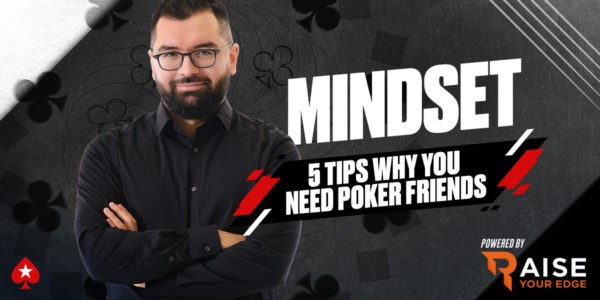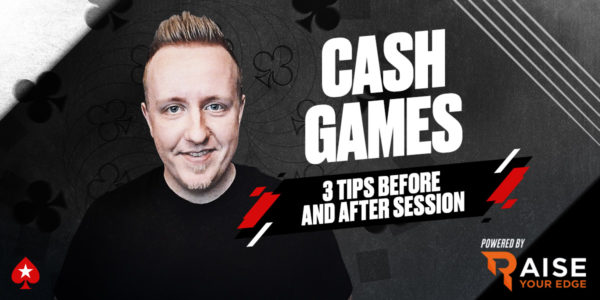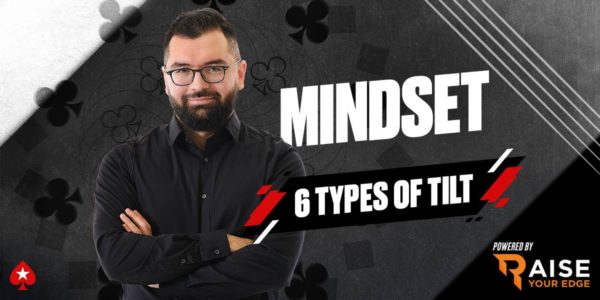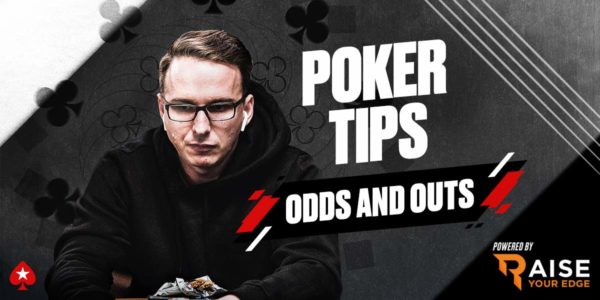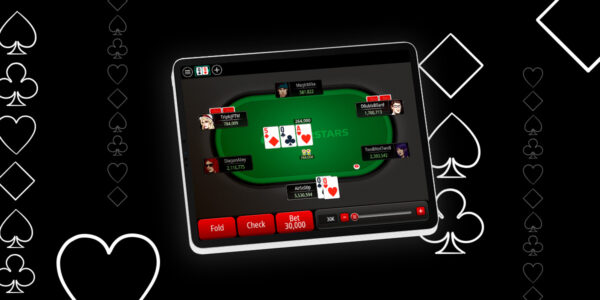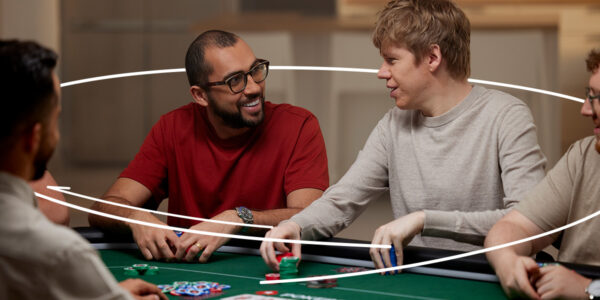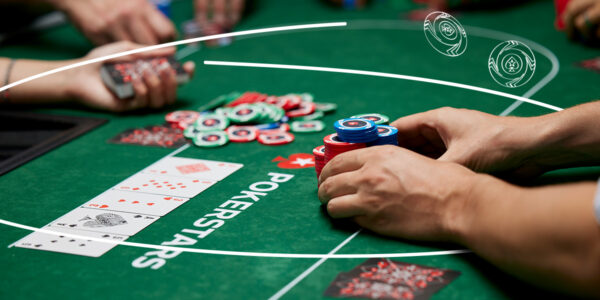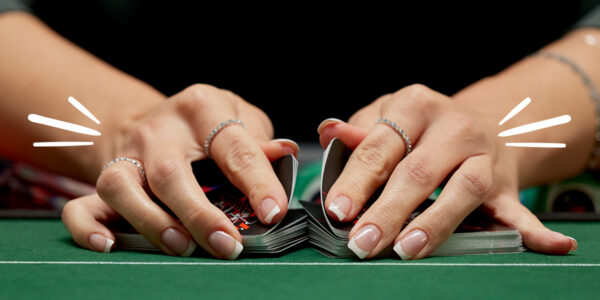Releasing your Fear in Poker
Fear is a killer in poker. I was recently talking with a StarsSchool member who had gotten heads up in a tournament. They lack confidence in their heads up game, but have been trying to ramp up the aggression recently when shorthanded or heads up, and sent me a couple hand examples to ask if they overdid it, or should have slowed down. During our conversation, they said something interesting, which gave me the idea for this article because I think it is a more common problem than we realize. After discussing aggression in heads up play, they said: “I find that most of the time my opponent is the LAG (loose-aggressive) one and I’m tight and passive because I play so scared. Because playing heads up usually means you’re playing for a big prize and I just get too scared of losing.”

First, what a powerful statement that is! I suspect these are feelings most of us have had at one time or another, and many won’t admit it because their egos get in the way. Simply coming to terms with the fact that this is your mindset at times is the first step to alleviating the problem. And make no mistake, it’s a problem because when you are too scared of losing, you instinctively play not to lose, instead of playing to win, and there is a big difference. These differences are magnified shorthanded and heads up of course, where ranges are wider and hand strengths much weaker in general, thus creating many hands where the player being aggressive, applying pressure, will win the small and medium pots without a fight… a real back breaker in a spot where frequently no one has much of anything, as occurs in heads up play. So, let’s talk a bit about 3 of the killer fears that hold players back in the end game of tournaments.
Fear of the Money
This is precisely the problem we were discussing above. The biggest prize is paid out to 1st place, and considering that can be 100x your buy in or more in large field events, it’s certainly understandable that playing for such a prize would make people nervous. There are 2 things to keep in mind in this regard that will help. The first is you’re not really playing for that first-place prize. For example, I played in a $20+2 buy in online tournament recently that had 1825 entrants. 1st place was $5821.75… 291x the $20 buy in. But that’s not what the final 2 were actually playing for. 2nd place paid $4380, a prize that the final 2 players had already locked up. So, in reality they were playing for the extra $1441.75 that would go to the winner. It’s still a huge pay jump obviously, but understanding this reality may help with the mental hurdle of the money fear. The second is your opponent may well be experiencing this fear factor as well. If you’re ever going to err in heads up play, erring on the side of aggression is much better than airing on the side of being tight/passive since frequently neither player has much. And if your opponent is nervous about the stakes at hand, the benefits of aggression against them are magnified by this fear. Resolve to give yourself the best chance to win.
Fear of Losing
This fear impacts players throughout tournaments. I was coaching a player once who was way too tight, folding hands that were clear plays if their entire stack might be at risk. After discussing several of these spots, they came to the realization that the reason they were folding anything they weren’t “sure” about is because they were afraid of losing the tournament. My advice is to get over it. If not winning a tournament is a back breaker for you, then perhaps give cash games a try. If 1000 people enter a tournament, 999 of them won’t win, it’s as simple as that. I know, you’d consider at least making the money a form of victory. The greatest tournament players get ITM in the vicinity of 15% of the time (most span a range of 12-20% depending on how aggressively they play the early stages and money bubble). The truth is, if you play MTT’s, you are going to bust almost every single one you enter. 80-90% of them without a payday. Make your piece with that now, and give yourself permission to take the chances necessary to accumulate chips and win tournaments.

Fear of embarrassment
This is a big one for many people. If I make this call that may be lite, or this aggressive 3B shove with the K2s and run into AA I’m going to look stupid, silly, or like a fish. This effect is more pronounced in live tournaments where everyone at your table is looking at you directly. People generally don’t like to look silly or feel dumb. The best advice I can give here is, just get over yourself. Everyone has made a silly play or taken a foolish line before at the tables. No one is exempt. Further, if you think it’s the right play, go ahead and make it. If you have reason to question it later, that’s fine, you can run it through analyzers, discuss with poker friends who are competent players or with a coach, etc. Was 3-betting all in for 15 bigs with K2s over the button open foolish simply because they turned over AA? No, of course not, that’s massively results oriented. If the button opener is a very tight, conservative player who doesn’t widen up their range in late position to include steals, then shoving K2s over them is a punt. If however, they are like most players, opening super wide on the button with all kinds of junky hands when it folds to them, then the shove quickly becomes very profitable because of all the times they simply have to fold and give you the blinds, antes, and their open raise without a fight. Of course, they are entitled to wake up with AA. But if they are opening J4s and 86o and everything in between, you are leveraging heaps of fold equity shoving over them, and oh when you do run into the unlucky scenario of them having AA this time, you still have 15% equity, meaning 3 times out of 20 you’ll suck out on their aces and get a huge double up. And maybe a lecture and unflattering note tagged on you. So what? If the play shows a long-term profit, don’t be afraid to pull the trigger even though you will feel silly when they have AA this time. Picking up these chips without a real hand by attacking their overly wide button open range is part of how tournaments are won.
A famous poker player was once quoted as saying, “In order to win a tournament, you can’t be afraid to lose it”. In a nutshell, this is what he was talking about. When fear takes over, we start to play “not to lose”, rather than playing to win, which unless the deck runs all over us repeatedly will not help us accumulate the chips necessary to get to the winner’s circle. As another famous poker player, Doyle Brunson once said, “Don’t be afraid to go out on a limb… that’s where the fruit is.”
Condimentum Nibh
Donec sed odio dui. Cras mattis consectetur purus sit amet fermentum. Vestibulum id ligula porta felis euismod semper. Curabitur blandit tempus porttitor.



